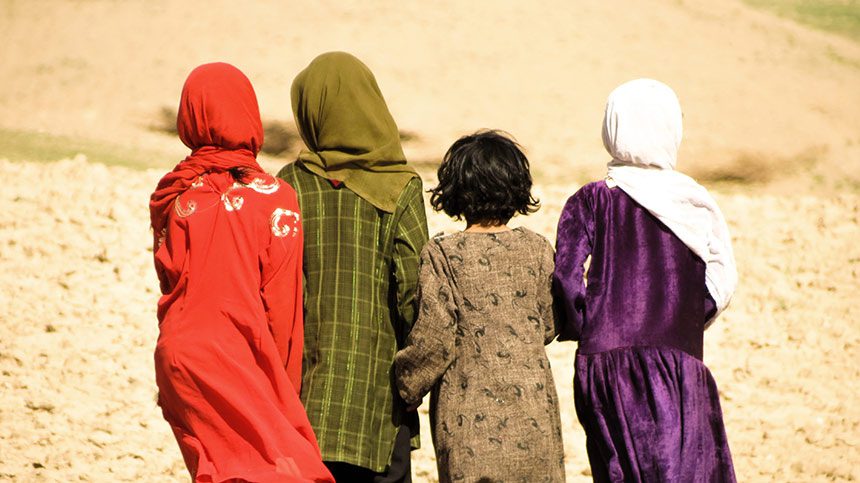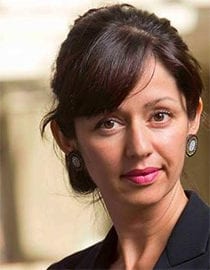
By Andrew Cohen
For Afghan refugees Zulaikha Aziz ’08 and Roya Massoumi ’04, the humanitarian crisis raging in their home country is excruciating. A new Berkeley Law initiative they helped create in response — fueled by students, faculty, and staff mobilizing to launch it at lightning speed — offers an impactful opportunity to help.
Led by Aziz and Massoumi, in collaboration with fellow alumna and Afghan refugee Amelia Miazad ‘02, the Berkeley Law Afghanistan Project will initially focus on two urgent needs: establishing a pro bono initiative to help Afghans resolve legal issues impeding their ability to leave, and preserving evidence of human rights abuses committed by the Taliban.
“It’s been humbling and overwhelming,” Massoumi says. “We feel really supported by Berkeley Law and grateful that the school has put such effort and resources behind creating this project. It has all evolved very quickly.”

The project will be housed at Berkeley Law’s Miller Institute for Global Challenges and the Law, with plans over time to delve into longer-range policy and advocacy work.
Aziz and Massoumi share a great deal in common. Each fled Afghanistan as a child with their families in the early 1980s, settled in the United States, attended Berkeley Law to work on social justice issues, and were interns for the International Human Rights Law Clinic.
“I’ve had a long and close relationship with Laurel Fletcher,” Aziz says of the clinic’s co-director. “We worked on the Guantanamo Bay project together and even traveled to Afghanistan to interview released detainees, the majority of which were Afghan. I’ve stayed connected to the school academically over the years and just last week published an article with co-author Hana Ivanhoe (“Combating Corruption to Counter Conflict”), looking specifically at Afghanistan for the Berkeley Journal of International Law.”
When the Taliban seized control in Afghanistan, Aziz, Massoumi, and Miazad, director of Berkeley Law’s Business in Society Institute, called Fletcher to discuss the harrowing events and how the school could respond.
“We’re all trying to deal with the stress of having family, colleagues, and friends who can’t get out,” Massoumi says. “By merging efforts with Berkeley Law, we aim to provide assistance in a greater and more meaningful capacity.”
Pro Bono Program Director Deborah Schlosberg promptly sprang into action, announcing the need for assistance on Thursday. Just three days later, 63 students attended her meeting about how they could provide desperately needed legal assistance. Today nearly 70 students have signed up for the effort.
Trauma re-lived
A veteran human rights lawyer, Aziz has spent the past nearly 20 years working on and off in Afghanistan. Her professional connections in the country run deep, and she has close family living there.
During a phone interview for this article, Aziz got an urgent call about an evacuation flight with possible room for those under serious threat.
“This has all been retraumatizing for us,” she says. “For Afghan-Americans like us at least we have the capacity to filter the information about what’s happening and to know what channels to pursue. When our parents were trying to flee they had nothing like that. They were on their own, and it was terrifying. That’s why we want to provide as much relief as we can. Our whole lives were spent dealing with that trauma and legacy of having to flee and not wanting to.”

Miazad and other faculty members are engaging their professional contacts in the business and academic world, and the Development & Alumni Relations office is helping to facilitate fundraising efforts.
“I’ve been heartened by the response of the business community in the U.S.,” Miazad says. “And as an Afghan refugee and member of the Berkeley Law community, I am grateful. I have renewed hope that we can have a meaningful impact. But only if we can sustain the focus on the humanitarian crisis in Afghanistan.”
Massoumi has had a long career representing public and federal agencies. She specializes in compliance with federal civil rights law, including Title VII. As counsel for the Social Security Administration, she — like Aziz — has maintained a strong connection to the International Human Rights Law Clinic.
“My time there was a wonderful experience and it has always stayed with me,” Massoumi says. “The first people I called when I saw these human rights violations were happening were Laurel Fletcher and Kate Jastram (Berkeley Law lecturer and former Miller Institute faculty director).”
Aziz has vast experience as an attorney and international development specialist working with international and local organizations on human rights issues around the world with a particular focus on Afghanistan. She has worked extensively on the ground in Afghanistan on access to justice and women’s rights projects.
“I have colleagues in Afghanistan from before law school who are now in real danger,” Aziz says. “I also have family who live there. Many friends and colleagues are from religious and ethnic groups being targeted by the Taliban; some worked for the former government and have already received threats. It’s terrifying.”
Massoumi, who has also organized a protest in Fremont, says channeling their fear and concern into collaborative efforts such as the new Berkeley Law initiative offers the best way to achieve a productive response.
“This project is the result of a call on humanity to do something,” she says. “A few days ago, it was me and Zulaikha and Amelia in our own universes, seeing this huge international need and trying to figure out ways to address it. It took a village, but the Berkeley Law community is incredible.”